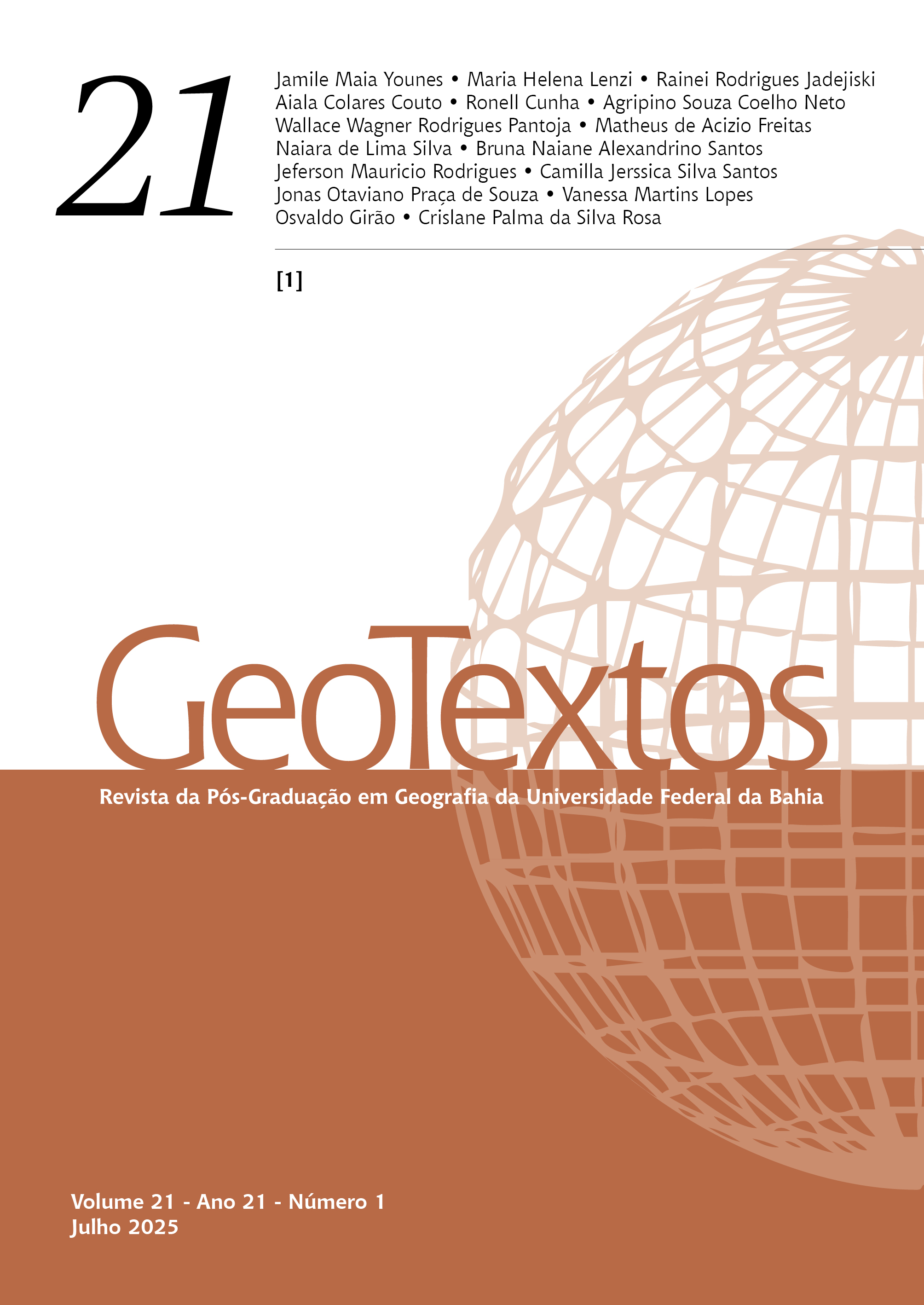SMART TOURISM DESTINATION AS A SPATIALIZATION OF THE SMART CITY MODEL IN FLORIANÓPOLIS/SC
DOI:
https://doi.org/10.9771/geo.v0i1.65590Keywords:
smart cityAbstract
In recent decades, cities have adopted neoliberal policies, emphasizing competitiveness, marketing, public-private partnerships, and the concentration of investments in selective spaces. A model that stands out in this context is the smart city, which uses information and communication technologies (ICTs) to optimize urban management. Cities like Rio de Janeiro/RJ and Curitiba/PR implement this model in their administrations. Florianópolis also adopts the smart city model, with the Intelligent Tourist Destination (DTI) certification being a development of this process. This article, with a qualitative and exploratory approach, aims to investigate the impact of the "promotion and marketing" axis of the DTI certification, focusing on the use of technologies such as apps, interactive boards with QR codes, and surveys. It was observed that these tools are aimed at data collection, with the goal of generating market trends. The use of these technologies proved to be focused primarily on generating market trends, in addition to the certification being promoted to showcase the city as modern, efficient, and well-structured to attract investments, standing out as a competitive advantage for businesses.
Downloads
References
BRASIL. Ministério do Turismo. Processo de transformação de Destinos Turísticos Inteligentes (DTI). Brasília: Ministério do Turismo, 2022.
BRENNER, N.; PECK, J.; THEODORE, N. After neoliberalization? Globalizations, v. 7, n. 3, p. 327-345, 2010.
COMPANS. R. Empreendedorismo Urbano: entre o discurso e a prática. São Paulo: UNESP, 2005.
DARDOT, P.; LAVAL, C. A nova razão do mundo: ensaio sobre a sociedade neoliberal. São Paulo: Boitempo, 2016.
DIRKS, S.; KEELING, M. A vision of smarter cities: how cities can lead the way into a prosperous and sustainable future. New York: IBM Institute for Business Value, 2009.
FRASE, P. A dialética da tecnologia. Revista Jacobin. Disponível em: https://jacobin.com.br/2023/05/a-dialetica-da-tecnologia/. Acesso em 30 mai. 2023.
FREIRE-MEDEIROS, B; FREITAS, J. Rio, Cidade Inteligente? Mobilidade de políticas e políticas de mobilidade no contexto dos megaeventos. Interseções: Revista de Estudos Interdisciplinares, v. 22, n. 2, p. 201-224, set. 2020. Disponível em: https://doi.org/10.12957/irei.2020.54461. Acesso em 05 jan. 2024.
HARVEY, D. A Produção Capitalista do Espaço. São Paulo: Annablume, 2005.
HOLLANDS, R. Will the real smart city please stand up? Intelligent, progressive or entrepreneurial? City, v. 12, n. 3, p. 303-320, 2008. Disponível em: https://doi.org/10.1080/13604810802479126. Acesso em 05 jan. 2024.
ISRAEL, C. Smart city: a digitalização do espaço urbano como governo algorítmico. In: MOURA, R.; FREITAS, O. L. C. de (Org.). Reforma urbana e direito à cidade. Rio de Janeiro: Letra Capital, 2022. p. 35-51.
MOROZOV, E; BRIA, F. A Cidade Inteligente: Tecnologias Urbanas e Democracia. São Paulo: UBU/Fundação Rosa Luxemburgo, 2019.
NOW BOARDING. Rota Turística Inteligente interage com turistas em Florianópolis. Disponível em: https://nowboarding.com.br/rota-turistica-inteligente-florianopolis/. Acesso em 01 abr. 2024.
OLIVEIRA, F. L et al. Métricas para uma Rio Smart: uma iniciativa piloto para um plano nacional. In: KRAUS, L. et al. (Org.) Cidades inteligentes e contradições urbanas: reflexões para a garantia do direito à cidade. Rio de Janeiro: Garamond, 2023. p. 153-172.
SÁNCHEZ, F. A reinvenção das cidades para um mercado mundial. Chapecó: Argos, 2003.
SIQUEIRA, M; LUCAS, A. Nem tudo o que reluz é ouro: Florianópolis e o urbanismo competitivo. Cadernos Metrópole, v. 25, n. 57, Mai./Ago. 2023. Disponível em: https://doi.org/10.1590/2236-9996.2023-5703 Acesso em 05 jan. 2024.
TOURQUAL. Plano de Ações para atendimento aos requisitos de autoavaliação Destino Turístico Inteligente - DTI. Florianópolis/SC, 2021
VAINER, C. B. Pátria, empresa e mercadoria. Notas sobre a estratégia discursiva do Planejamento Estratégico Urbano. In: ARANTES, O.; VAINER, C.; MARICATO, E. (Org.). A cidade do pensamento único: desmanchando consensos. Petrópolis: Editora Vozes, 2002. p. 75-103.
Downloads
Published
How to Cite
Issue
Section
License
Autores que publicam nesta revista concordam com os seguintes termos:
Autores mantém os direitos autorais e concedem à revista o direito de primeira publicação, com o artigo simultaneamente licenciado sob a Licença Creative Commons Creative Commons CC BY que permite o compartilhamento do trabalho com reconhecimento da autoria e publicação inicial nesta revista. Esta licença permite que outros distribuam, remixem, adaptem e criem a partir do seu trabalho, mesmo para fins comerciais, desde que lhe atribuam o devido crédito pela criação original. É a licença mais flexível de todas as licenças disponíveis. É recomendada para maximizar a disseminação e uso dos materiais licenciados. Ver o resumo da licença em: https://creativecommons.org/licenses/by/4.0/ Ver o texto legal da licença em: https://creativecommons.org/licenses/by/4.0/ Consulte o site do Creative Commons: https://creativecommons.org/licenses/?lang=pt
Autores têm autorização para assumir contratos adicionais separadamente, para distribuição não-exclusiva da versão do trabalho publicada nesta revista (ex.: publicar em repositório institucional ou como capítulo de livro), com reconhecimento de autoria e publicação inicial nesta revista.
Autores têm permissão e são estimulados a publicar e distribuir seu trabalho online (ex.: em repositórios institucionais ou na sua página pessoal) a qualquer ponto antes ou durante o processo editorial, já que isso pode gerar alterações produtivas, bem como aumentar o impacto e a citação do trabalho publicado (Veja O Efeito do Acesso Livre).










